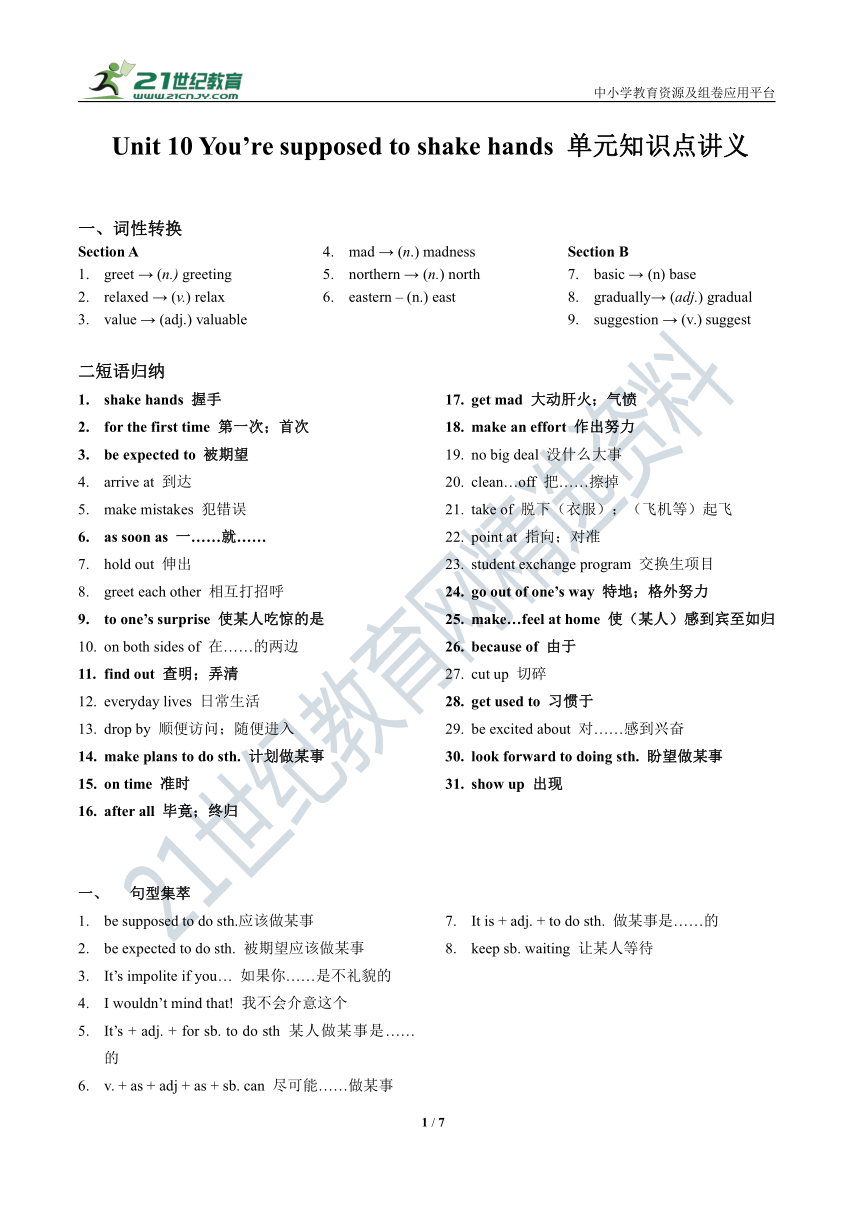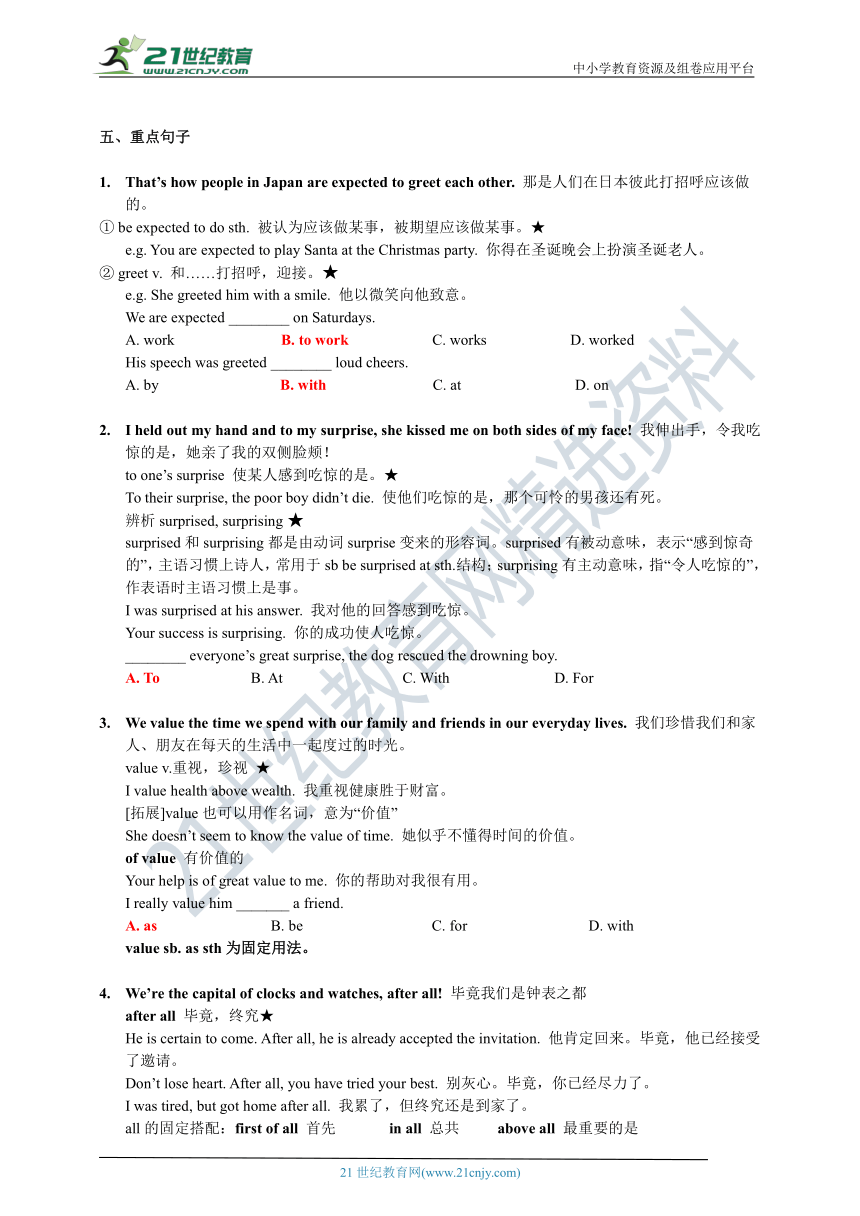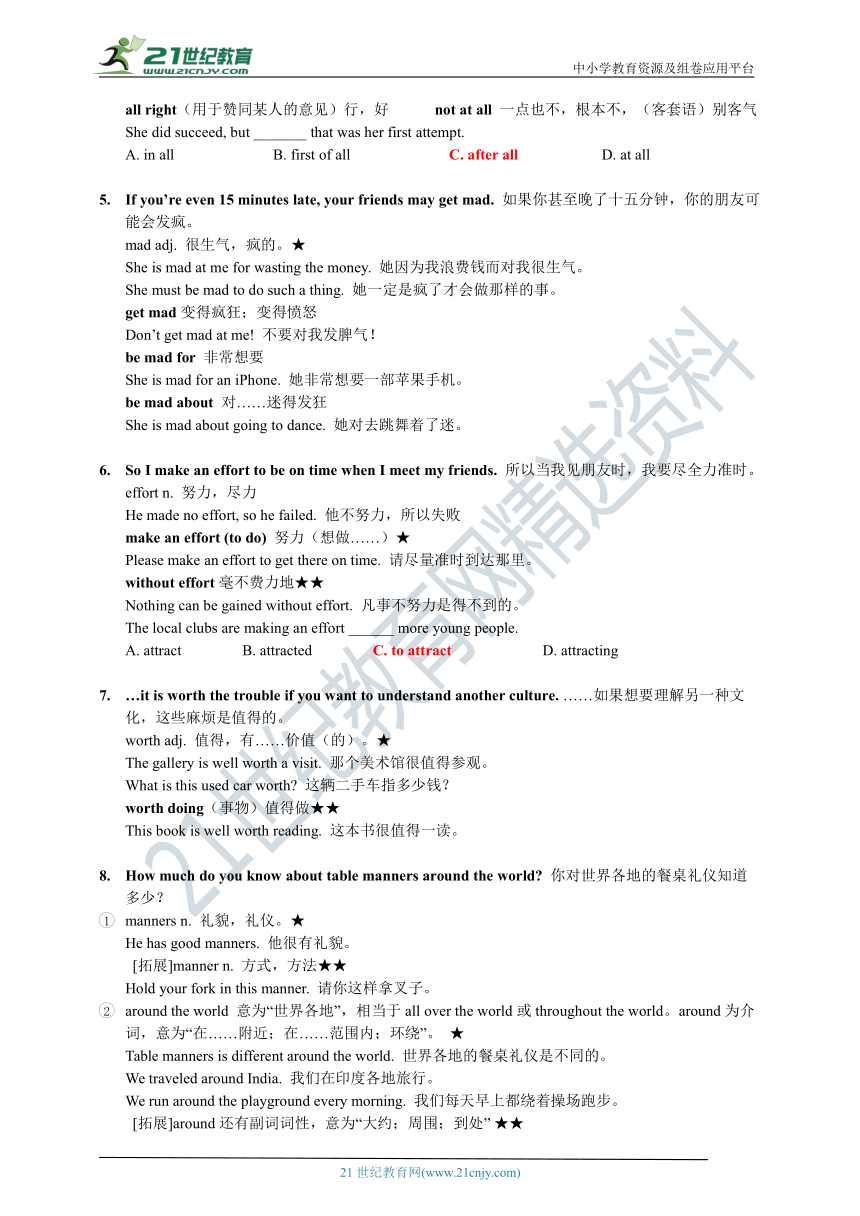Unit 10 You're supposed to shake hands 单元知识点讲义
文档属性
| 名称 | Unit 10 You're supposed to shake hands 单元知识点讲义 |  | |
| 格式 | zip | ||
| 文件大小 | 1.2MB | ||
| 资源类型 | 试卷 | ||
| 版本资源 | 人教新目标(Go for it)版 | ||
| 科目 | 英语 | ||
| 更新时间 | 2020-02-04 21:22:07 | ||
图片预览



文档简介
中小学教育资源及组卷应用平台
Unit 10 You’re supposed to shake hands 单元知识点讲义
一、词性转换
Section A
greet → (n.) greeting
relaxed → (v.) relax
value → (adj.) valuable
mad → (n.) madness
northern → (n.) north
eastern – (n.) east
Section B
basic → (n) base
gradually→ (adj.) gradual
suggestion → (v.) suggest
二短语归纳
shake hands 握手
for the first time 第一次;首次
be expected to 被期望
arrive at 到达
make mistakes 犯错误
as soon as 一……就……
hold out 伸出
greet each other 相互打招呼
to one’s surprise 使某人吃惊的是
on both sides of 在……的两边
find out 查明;弄清
everyday lives 日常生活
drop by 顺便访问;随便进入
make plans to do sth. 计划做某事
on time 准时
after all 毕竟;终归
get mad 大动肝火;气愤
make an effort 作出努力
no big deal 没什么大事
clean…off 把……擦掉
take of 脱下(衣服);(飞机等)起飞
point at 指向;对准
student exchange program 交换生项目
go out of one’s way 特地;格外努力
make…feel at home 使(某人)感到宾至如归
because of 由于
cut up 切碎
get used to 习惯于
be excited about 对……感到兴奋
look forward to doing sth. 盼望做某事
show up 出现
句型集萃
be supposed to do sth.应该做某事
be expected to do sth. 被期望应该做某事
It’s impolite if you… 如果你……是不礼貌的
I wouldn’t mind that! 我不会介意这个
It’s + adj. + for sb. to do sth 某人做某事是……的
v. + as + adj + as + sb. can 尽可能……做某事
It is + adj. + to do sth. 做某事是……的
keep sb. waiting 让某人等待
五、重点句子
That’s how people in Japan are expected to greet each other. 那是人们在日本彼此打招呼应该做的。
① be expected to do sth. 被认为应该做某事,被期望应该做某事。★
e.g. You are expected to play Santa at the Christmas party. 你得在圣诞晚会上扮演圣诞老人。
② greet v. 和……打招呼,迎接。★
e.g. She greeted him with a smile. 他以微笑向他致意。
We are expected ________ on Saturdays.
A. work B. to work C. works D. worked
His speech was greeted ________ loud cheers.
A. by B. with C. at D. on
I held out my hand and to my surprise, she kissed me on both sides of my face! 我伸出手,令我吃惊的是,她亲了我的双侧脸颊!
to one’s surprise 使某人感到吃惊的是。★
To their surprise, the poor boy didn’t die. 使他们吃惊的是,那个可怜的男孩还有死。
辨析surprised, surprising ★
surprised和surprising都是由动词surprise变来的形容词。surprised有被动意味,表示“感到惊奇的”,主语习惯上诗人,常用于sb be surprised at sth.结构;surprising有主动意味,指“令人吃惊的”,作表语时主语习惯上是事。
I was surprised at his answer. 我对他的回答感到吃惊。
Your success is surprising. 你的成功使人吃惊。
________ everyone’s great surprise, the dog rescued the drowning boy.
A. To B. At C. With D. For
We value the time we spend with our family and friends in our everyday lives. 我们珍惜我们和家人、朋友在每天的生活中一起度过的时光。
value v.重视,珍视 ★
I value health above wealth. 我重视健康胜于财富。
[拓展]value也可以用作名词,意为“价值”
She doesn’t seem to know the value of time. 她似乎不懂得时间的价值。
of value 有价值的
Your help is of great value to me. 你的帮助对我很有用。
I really value him _______ a friend.
A. as B. be C. for D. with
value sb. as sth为固定用法。
We’re the capital of clocks and watches, after all! 毕竟我们是钟表之都
after all 毕竟,终究★
He is certain to come. After all, he is already accepted the invitation. 他肯定回来。毕竟,他已经接受了邀请。
Don’t lose heart. After all, you have tried your best. 别灰心。毕竟,你已经尽力了。
I was tired, but got home after all. 我累了,但终究还是到家了。
all的固定搭配:first of all 首先 in all 总共 above all 最重要的是
all right(用于赞同某人的意见)行,好 not at all 一点也不,根本不,(客套语)别客气
She did succeed, but _______ that was her first attempt.
A. in all B. first of all C. after all D. at all
If you’re even 15 minutes late, your friends may get mad. 如果你甚至晚了十五分钟,你的朋友可能会发疯。
mad adj. 很生气,疯的。★
She is mad at me for wasting the money. 她因为我浪费钱而对我很生气。
She must be mad to do such a thing. 她一定是疯了才会做那样的事。
get mad变得疯狂;变得愤怒
Don’t get mad at me! 不要对我发脾气!
be mad for 非常想要
She is mad for an iPhone. 她非常想要一部苹果手机。
be mad about 对……迷得发狂
She is mad about going to dance. 她对去跳舞着了迷。
So I make an effort to be on time when I meet my friends. 所以当我见朋友时,我要尽全力准时。
effort n. 努力,尽力
He made no effort, so he failed. 他不努力,所以失败
make an effort (to do) 努力(想做……)★
Please make an effort to get there on time. 请尽量准时到达那里。
without effort毫不费力地★★
Nothing can be gained without effort. 凡事不努力是得不到的。
The local clubs are making an effort ______ more young people.
A. attract B. attracted C. to attract D. attracting
…it is worth the trouble if you want to understand another culture. ……如果想要理解另一种文化,这些麻烦是值得的。
worth adj. 值得,有……价值(的)。★
The gallery is well worth a visit. 那个美术馆很值得参观。
What is this used car worth? 这辆二手车指多少钱?
worth doing(事物)值得做★★
This book is well worth reading. 这本书很值得一读。
How much do you know about table manners around the world? 你对世界各地的餐桌礼仪知道多少?
manners n. 礼貌,礼仪。★
He has good manners. 他很有礼貌。
[拓展]manner n. 方式,方法★★
Hold your fork in this manner. 请你这样拿叉子。
around the world 意为“世界各地”,相当于all over the world或throughout the world。around为介词,意为“在……附近;在……范围内;环绕”。 ★
Table manners is different around the world. 世界各地的餐桌礼仪是不同的。
We traveled around India. 我们在印度各地旅行。
We run around the playground every morning. 我们每天早上都绕着操场跑步。
[拓展]around还有副词词性,意为“大约;周围;到处” ★★
He arrived around five o’clock. 他大约是五点钟到的。
There were papers lying around all over the floor. 地板上四处散落着文件。
e.g. 吃饭时发出声音是不礼貌的。It’s ______ _______ to make noises at table. 答案:bad manners
Do you know how many local languages there are ________?
A. around China B. all over China C. throughout China D. All the above.
In Korea, the youngest person is expected to start eating first. 在韩国,最年轻的人应该先开始吃。
person用来表示具有某种特性或个性的人,为可数名词,可指man, woman或child,有单复数形式。
people除可作“人”讲外,还可表示“民族”,为可数名词。★
He’s just the person we need for the job. 他正是我们需要的做那种工作的人。
start意为“开始”。“开始做某事”已可表达为start to do sth., 又可表达为start doing sth. ★
He started to write. = He started writing. 他开始写。
In China, it’s impolite to use your chopsticks to hit an empty bowl. 在中国,用筷子敲空碗是不礼貌的。
It is + adj. + to do sth. 做某事是……的 ★
It is useful to learn English well. 学好英语是有用的。
hit v. (用手或器具)击,打。
My parents never hit me. 我的父母从不打我。
empty adj. 空的,空洞的 ★
The house is empty; no one is living here. 这座房子是空的,没有人住。
【年山西】It’s ______ to travel from Taiyuan to Taiwan now because the planes can get there directly. You can visit the island if you like.
A. difficult B. slow C. easy
He fell and _______ his head on the floor.
A. hit B. knock C. beat D. knocked
-- Can I help you carry the box?
-- No, thanks. There’s ________ in it. It’s empty.
A. something B. anything C. everything D. nothing
They go out of the their way to make me feel at home. 他们想方设法让我感到不拘束。
go out of one’s way to do sth. 意为“特意、专门(花心血、时间)做某事;不怕麻烦地做某事”。 ★
They went out of their way to help her. 他们想方设法帮助她。
He went out of his way to be rude to me. 他故意对我无礼。
They go out of their way to think of ways to serve all the passengers. 他们不怕麻烦,想方设法来为所有的乘客服务。
make为使役动词,意为“使;让”,后接省略to的动词不定式作宾语补足语。宾语补足语主要由名词、形容词、过去分词、介词短语来充当,其后也使用it作形式宾语。★★
The boss made him work twelve hours a day. 老板让他每天工作12个小时。
The bad news made me sad. 这条坏消息使我很难过。
Can you make yourself understood in English? 用英语时你能让人明白你的意思吗?
What he said made me happy. 他的话使我听了很高兴。
feel at home 意为“随便,无拘无束,宾至如归”。 ★
After a while we began to feel at home with each other. 我们之间很快就开始觉得无拘无束了。
They always make us feel very much at home. 他们总是使我们感到非常自在。
He went _______ his way to make things hard for me.
A. out B. out of C. in D. into
The peaceful music in the CD made the students _______ relaxed.
A. feel B. feels C. felt D. to feel
They are friendly and make me feel _______ at home.
A. in B. out of C. at D. like
Another example is you’re not supposed to eat anything with your hands except bread, not even fruit. 另一个例子是,除了面包以外,你不应该用手吃任何东西,甚至水果也不行。
except prep. 除……之外 ★
We must get up early everyday except Sunday. 除星期天外,我们每天必须早起。
辨析except, except for, besides ★
except是介词,相当于but,意思是“除了……之外”,表示在一个整体中,除去一个或多个(人或物)以外的其他全部,即强调部分不包括在内,一般用来排除同类事物。
Everyone is ready except you. 除了你以外,大家都准备好了。(你没准备好,其他人都准备好了)
except for指“除……之外”,即除去瑕疵,强调整体。
Your article is all right except for a few misprints. 你的文章没问题,只有一些印刷上的错误。
Your drawing is good except for some of the colors. 除有些颜色不好外你的绘画都很好。
besides指“除……之外还有”,含有肯定的、附加的意思,即一个整体中,强调一个或多个(人或物),强调部分包括在内。
We study chemistry, physics and other subjects besides English.
除了英语,我们还学化学、物理及其他学科。(学习的课程包括英语)
Two other boys were on duty besides Li Ming. 除了李明外,还有两个男生值日。(值日生包括李明)
-- All the clerks went home _______ Mr. Wang. Why?
-- Because he had to finish his work.
A. except B. besides C. without D. except for
I have to say that I find it difficult to remember everything, but I’m gradually getting used to it. 我不得不说,我觉得要把这一切记住很难,但我正在逐渐适应。
“find it + 形容词 + to do”结构中,it为形式宾语,真正的宾语为动词不定式to do,形容词充当宾语补足语,这样可以避免头重脚轻,使句子平衡。用于此结构的动词有:find, think, feel等。★
He found it very difficult to sleep and he was rather angry with the man upstairs.
他发现很难入睡,他就对住在楼上的人非常生气。
I think it important to study hard. 我认为努力学习很重要。
gradually为副词,意为“逐渐地;渐渐地”。 ★
She gradually got sicker and sicker. 她的病情渐渐变得越来越重了。
The climate is gradually becoming drier and warmer. 气候渐渐变得更干燥、更暖和了。
【年自贡】Did you find _____ very interesting to play volleyball?
A. this B. that C. it
五、语法归纳:be supposed to do sth.结构的用法
总述:be supposed to do sth.(被动结构)意为“应该,理应,有……义务,被期望/要求做某事”,to是动词不定式符号,不是介词,其后要跟动词原形。
You are supposed to know the law. 你应该懂得这项法令。
We are supposed to get there at nine. 我们应该9点到那儿。
变化形式:否定形式是在be动词后加否定副词not,此时相当于be not allowed to do,意为“不被许可做,不应该做”。疑问形式需将be动词的相应形式提到主语前。
We are not supposed to play football in the street. 我们不应该在大街上踢足球。
Is he supposed to get there at five? 他应该在5点钟到那儿吗?
拓展:
当be supposed to……的主语是物时,它意为“本应,本该”,用于表示“某事本应该发生而没有发生”。
The train was supposed to arrive half an hour ago. 火车本应在半小时之前到达。
be supposed to be有“某人/某事被认为……”的意思,其主动形式为“suppose sb. to be + 形容词/名词”。
All thse classmates suppose him to be stupid (= He is supposed to be stupid by all the classmate). But in fact, he is a good student.
专项训练
1. 【山东枣庄】In France you _______ put bread on the table. You are not supposed to put it on the plate.
A. shouldn’t B. are supposed to C. would like to D . will
2. You were _______ to close the windows. Why were you so careless?
A. allowed B. believed C. supposed D. caused
3. In China, you are not supposed ______ your bowl of rice.
A. to pick up B. picking up C. to pick out D. to pick off
4. You should have asked ____________.
A. what are you supposed to wear B. what you are supposed to wear
C. What you are suppose to wear D. what you suppose to wear
5. Students are ________ to speak loudly in the reading room.
A. told B. suppose C. not supposed D. allowed
57 / 57
同课章节目录
- Unit 1 How can we become good learners.
- Section A
- Section B
- Unit 2 I think that mooncakes are delicious!
- Section A
- Section B
- Unit 3 Could you please tell me where the restroom
- Section A
- Section B
- Unit 4 I used to be afraid of the dark.
- Section A
- Section B
- Unit 5 What are the shirts made of?
- Section A
- Section B
- Review of Units 1-5
- Unit 6 When was it invented?
- Section A
- Section B
- Unit 7 Teenagers should be allowed to choose their
- Section A
- Section B
- Unit 8 It must belong to Carla.
- Section A
- Section B
- Unit 9 I like music that I can dance to.
- Section A
- Section B
- Unit 10 You're supposed to shake hands.
- Section A
- Section B
- Review of Units 6-10
- Unit 11 Sad movies make me cry.
- Section A
- Section B
- Unit 12 Life is full of the unexpected
- Section A
- Section B
- Unit 13 We're trying to save the earth!
- Section A
- Section B
- Unit 14 I remember meeting all of you in Grade 7.
- Section A
- Section B
- Review of Units 11-14
